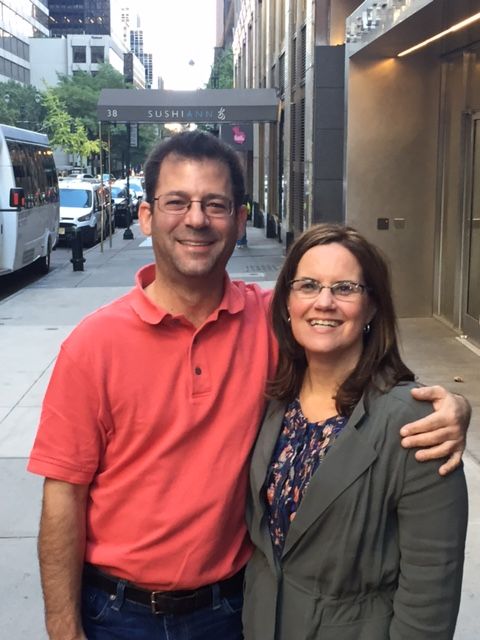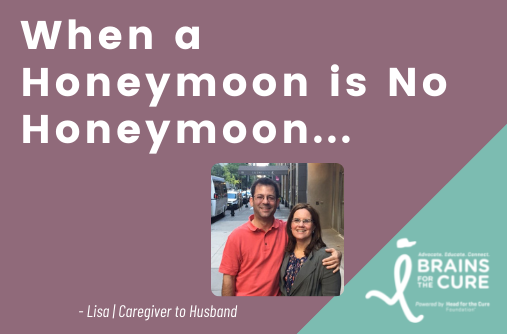When a Honeymoon is No Honeymoon…
June 29, 2021
Written by Lisa Lenrow | Brains for the Cure Ambassador

I got married late in life, having met my husband at 49. Three years after our blind date, Jon proposed. As I had been dreaming about my wedding since I was a little girl, I planned every detail of the event. Within the same six-months, we sold each of our individual homes, bought our marital home, planned our destination wedding, and worked full-time. We just didn’t have the capacity to plan our honeymoon, so we agreed to celebrate our marriage as part of our first anniversary. This belated holiday was a joyous occasion for me and Jon as we explored Italy’s Amalfi Coast.
But a year later, on our second anniversary, the term “honeymoon” was used in a very different context. We first heard it from Jon’s oncologist who advised us to enjoy the honeymoon-phase, which marked the time following Jon’s Grade IV glioblastoma diagnosis, surgery, and end of six weeks of radiation therapy. It was when Jon was to receive a break from multiple hospital stays and physical rehabilitation before he began intense chemotherapy treatments.
With our honeymoon trip to Italy still in the back of my mind, I started to think of places that we could go to spend this time together, as if it were an opportunity for an exciting escape – especially from cancer. We were blessed to have options such as flying to Costa Rica or West Palm Beach. But I was scared to be so far away alone with Jon and away from his doctors. So instead, I opted for a weekend in Cape May NJ a lovely, drivable honeymoon destination, which turned out to be anything but a celebration.
I loaded the car with our two dogs and the kitchen sink including Jon’s walker, just as a precaution. I was nervous driving because I was responsible for the most precious cargo and I was emotionally exhausted. I didn’t feel anything close to the excitement and wonderous anticipation as I had on our Italian adventure.
The weekend was a disaster – I took off the side-view mirror backing out of the garage. After breakfast on Saturday, Jon slept the entire day. Despite schlepping the shower stool, Jon didn’t bathe because of his fear of falling. It happened twice at home, and it traumatized him. I cancelled our dinner reservation and we headed home early Sunday morning.

To those with a cancer diagnosis and their caregivers, the term honeymoon can be a falsehood. Yes, Jon and I were blessed to have a few months where the tumor didn’t progress, Jon could walk independently, and we were incredibly fortunate to be able to enjoy long conversations about everything, which was the foundation of our relationship. But then one day, Jon demonstrated stroke-like symptoms, he was transported among three hospitals, and he became agitated, aggressive and unable to sleep. The time the doctors called a “honeymoon” was over.
I’ve heard similar stories from other caregivers. There is a phase where the patient seems content, comfortable, and even hopeful that they beat cancer and there is no doubt that you should enjoy every single minute, because with a GBM diagnosis, the odds are stacked against you. With the lack of advancements in medical treatments for this horrendous disease, the median survival rate is eight months. Jon survived nine months.
My advice is don’t be fooled by what your doctors may call the honeymoon phase. If you are fortunate to get a break when your loved one is feeling better, has more energy, and you can enjoy some of the activities from “BC” (before cancer), take every advantage of them. You don’t know when or if it will happen or how long it may last.
